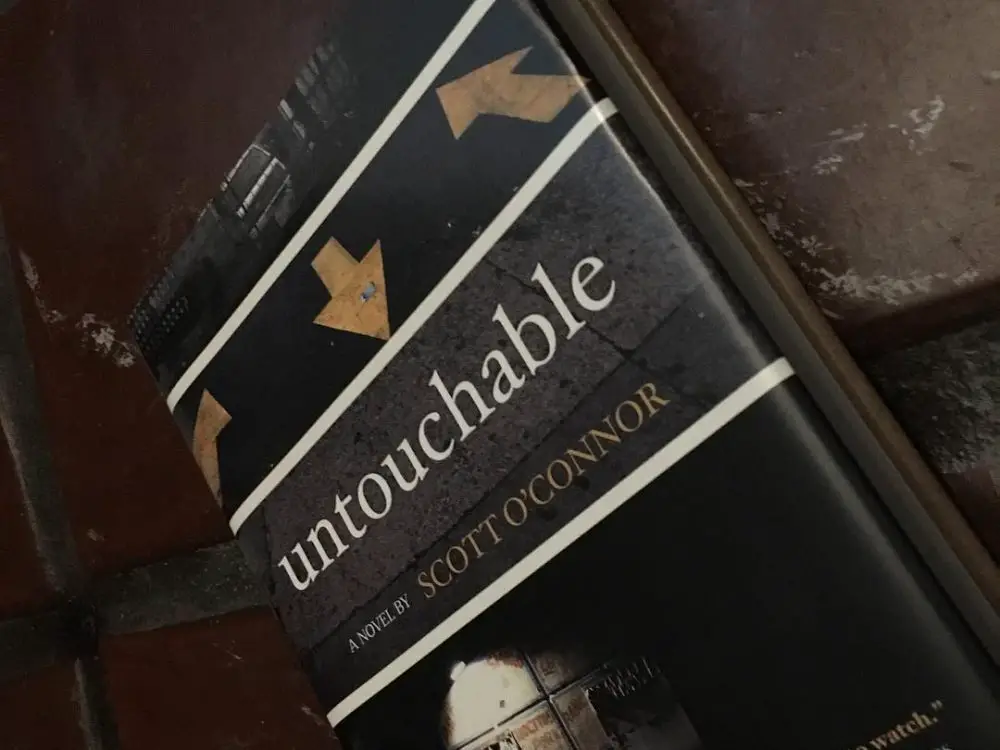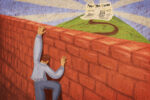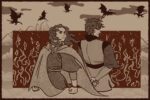My freshman year of high school is when I first came across the novel “Untouchable” by Scott O’Connor. I hadn’t read anything for a few months, and I impulsively bought a ton of books. When I attempted to start the novel, I only made it through a few pages. Who knew it would become one of my favorite books ever?
“Untouchable” follows 11-year-old Whitley Darby in 1999. After the unexpected death of his mother, he stopped speaking to his father, David Darby. He now speaks to him through a series of notebooks. Whitley, also known as the Kid, believes his father lied to him, and his mother is still alive.
David cleans up trauma sites and helps families of strangers move in for a living. “The trick of the job is to forget what had happened,” he says. However, David’s broken family is the one that needs the mending, as the Kid refuses to speak until his mother returns. Due to his urgency, the Kid recruits his misfit friends to help, including his best friend, Mathew Crump.
With this momentum and the idea of Y2K creeping closer, the Kid and David are forced to confront each other to heal their family.
Who Is Scott O’Connor?
O’Connor grew up in Syracuse, New York. He did not start to write professionally until his 20s. During his time in the film industry, he realized his scripts felt unfulfilled “without the camera to tell the other half of the story.” So O’Connor moved to literature.
Along with “Untouchable,” O’Connor published the novels “A Perfect Universe: Ten Stories,” “Zero Zone,”“Half World” and “Among Wolves.” He won the Barnes & Noble Discover New Writers award, and his stories have been shortlisted for the Sunday Times EFG Short Story prize. O’Connor has also appeared in the New York Times Magazine, Zyzzyva, The Rattling Wall and the Los Angeles Review of Books.
He currently teaches creative writing at Cal State Channel Islands and in workshops in Los Angeles.
There are two main things that make O’Connor’s “Untouchable,” a journey of loss and healing, so brilliant.
Unusual Writing Style
Despite it taking a few chapters to get used to, I never missed a single syllable.
O’Connor switches between the father and the Kid’s perspective, often through describing scenes and feelings, making you feel as if you are there. This method becomes helpful as the characters’ mental states are pushed over the edge. For instance, David’s obsessive thoughts become more prevalent, and switching the points of view contributes to making his thought pattern evident to the reader.
Overall, O’Connor’s writing style is fearless. He admitted to his literature publisher, Tethered by Letters, that he spent countless hours over his writing desk to complete the novel.
“You have to give yourself the freedom to follow your story wherever it goes,” O’Connor said.
He held nothing back when describing the pain behind the Kid’s choice to become voiceless. I almost went into denial with him. But, at the same time, you wanted to get in his face and wake him up to reality.
Beautiful Characters
As a journalism major, one of the first things I learned is that readers love stories with a human interest. O’Connor used this strategy, but proved he did not need drama on every page. He just needed the power of humanity with basic human reactions and feelings
In an interview with Tethered by Letters, he even said the characters revealed themselves before the theme, plot or setting. O’Connor first tried to write the Kid and David into a short story, but he discovered there was more to tell.
The Kid is trying to survive in the world around him. He deals with taunting and bullying from his classmates. All he wants is his mom back, even if that means not speaking.
David Darby has lingering questions about his wife’s death during the momentum of Y2K. He is also dealing with other families’ pain before his own. Everything seemed easier when his wife was by his side.
Although O’Connor initially set “Untouchable” in more contemporary times, he decided the Kid would have discovered “many of the mysteries early on if he had access to the internet.”
He said to Tethered by Letters, “85% of the story is getting the voices just right,” with the story developing after this.
Honest Writing
I’ve read “Untouchable” quite a few times, and each time, as a reader, I gain a greater understanding of the text and appreciate O’Connor’s ideas more. As a writer, I am always learning new tricks to apply to my own work.
Good writers always say the truth — whether it be their own, or reporting what is said at a city hall meeting.
Good authors, writers, journalists or whatever title you prefer have much more in common than it seems at first glance. It is always the honest and real writing that strikes a chord with readers; those aspects are what keep people coming back to reread.
You need to have the reader in mind when creating, to a certain extent. When writing a news article, the first thing I think of is, “What would the reader want to know?”
However, when creating fiction, and even non-fiction, my best work always happens when I am open to showing my own perspective of how I see the world.
“Untouchable” reminds me to stay fearless when writing, and I reread it when I need that extra push.

















